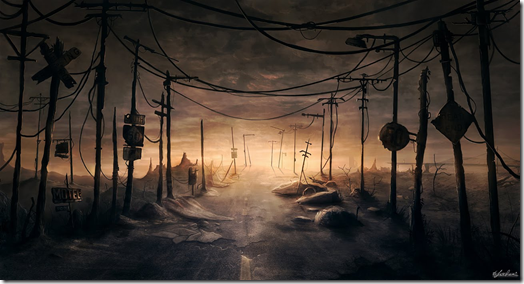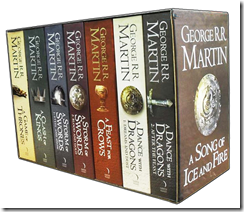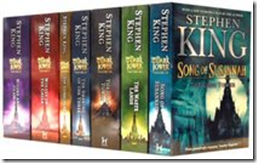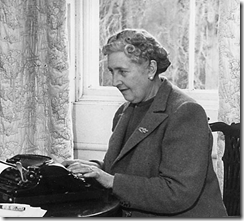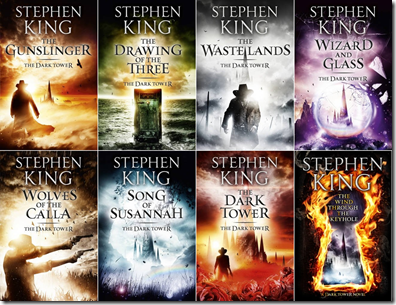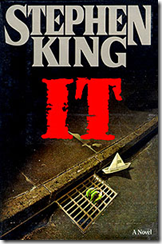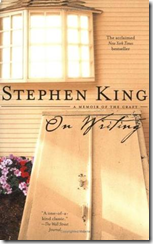I worry that George R.R. Martin will die before finishing his Song of Fire and Ice series, and yes, that’s not a nice thing to think.
/George R.R. Martin is the author of the popular Song of Fire and Ice series which you may know better as Game of Thrones.
He’s currently writing the sixth of that was originally going to be seven books in the series, though he recently hinted that there may be an eighth.
Martin is 65 years-old. He’s not exactly the picture of health.
It took him six years to write the most recent book in the series, A Dance with Dragons, and it has taken him 15 years to write the five books written so far.
At this pace, he will complete the final two books by the time he is 72 years-old, and if there really is an eighth book planned, he will be close to 80 when he finally wraps the series.
For these reasons, I have decided to wait to read the books, fearing his demise before the series is complete.
This is not an entirely unfounded position. Stephen King’s Dark Tower series (which you should all read immediately) was nearly cut short when King was hit by a van and nearly killed in 1999 with three books to go.
When I first heard about the accident, my first thoughts went to The Dark Tower’s Roland and his ka-tet. As saddened as I was to hear about King’s death (it was originally announced that King had died in the accident), I was equally distraught over the idea that Roland’s journey to The Dark Tower would never be realized.
Perhaps fearful that he may never finish the series if he didn’t work quickly, King promptly completed the final three books in the series in 2004 (publishing one in 2003 and two in 2004).
Then he added a book for good measure in 2012.
So yes, I worry about Martin’s ability to complete his masterpiece. He’s not a young man, and he seems to require about five years to finish a book. I was nearly left hanging in the midst of a masterpiece once before. I don’t want that to happen again.
Apparently I am not alone in this sentiment. Others have expressed this concern openly and often. Martin recently addressed the many people who have expressed concerns over his ability to complete the series before his demise:
“I find that question pretty offensive, when people start speculating about my death and my health. So f**k you to those people.”
He added a middle finger for good measure.
I deserve the rebuke. He’s right. It’s not exactly polite to speculate about an author’s longevity. If I were him, I’d be angry, too.
But when you want to stick it to someone like me, there are four words even more satisfying than simple vulgarity:
“I told you so.”
Finish the books, George. Make me look like a fool for ever doubting you.
I may not be an author yet, but I write like one.
/I’ve published three novels since 2009. All three were sold internationally, including the most recent, Memoirs of an Imaginary Friend, which has been translated into 25 languages worldwide and is an international bestseller.
All three of my novels have been optioned for television or film.
My next novel, The Perfect Comeback of Caroline Jacobs, is in the final stages of revision with my editor.
I’ve even co-written a rock opera that was produced at a local theater last year.
Despite this success, I still don’t think of myself as an accomplished author. I feel like I have much to prove. I consider myself a rookie. A newbie. Possibly a pretender.
Maybe this is something all writers go through. I often wonder how many books I will need to publish before I don’t feel odd referring to myself as an author.
Oddly enough, it’s often not the success of any of my books that makes me feel most akin to other authors, but instead the discovery that we have something in common in terms of the craft.
I read some facts about other authors much better than me recently that gave me hope that I might also be a real author, or at least I might begin thinking about myself as a real author.
Agatha Christie never owned a desk. She wrote 80 novels and 19 plays wherever she could sit down.
I own a desk in an unheated, insulated “office” off my living room. In the winter, the room is literally freezing. I don’t think I have ever written a single word of fiction while sitting at that desk.
I do much of my writing on my dining room table, but I also write in libraries, bookstores, my children’s bedrooms, fast food restaurants, hotels, coffee shops, public transportation, the teacher’s lunchroom and any other place that I can find.
I’m always amused by the writer who tells me that he or she can only write in a well appointed coffee shop while drinking a hazelnut latte. I’ve met many, many writers who claim that they can only under of specific conditions at specific times, but I have yet to meet a published author with such rigid requirements.
Stephen King writes every day of the year and aims for a goal of 2000 words each day.
I don’t have a daily word goal, mostly because I am often dividing my writing between two or three books plus this blog and another (and various other projects), so counting words would be hard.
But I have written every single day of my life for at least ten years, including my wedding day, every day of my honeymoon, and on the days that both of my children were born.
When Anthony Trollope finished writing one book, he immediately started another. Henry James did the same thing.
When I finished my first novel, Something Missing, I resolved to take a three month break from writing and begin the process of finding an agent. I typed the final word of the book on a Saturday afternoon, closed the document, sat for about 30 seconds, pondering my next move, and then opened a new Word document and began my next book.
I have done the same for every book since.
Difficulty staying Faithful
/I finished reading Faithful: Two Diehard Boston Red Sox Fans Chronicle the Historic 2004 Season by Stephen King and Stuart O’Nan, and while I enjoyed the bo0k, I have a few quibbles with it as well.
As a Yankees fan, I knew that reading the book would be difficult. The 2004 baseball season was the worst in Yankees history. After taking a 3-0 lead over the Red Sox in the battle for the pennant, the Yankees became the only team in baseball history to lose the next four games and thus lose the series.
This would be heart wrenching regardless of the opponent, but the fact that it was the Red Sox made it exponentially worse.
Still, I wanted to read this book. I’ve read everything else that Stephen King has ever written, and I adore the man.
While I haven’t quite read everything Stuart O’Nan has written yet, I like what I’ve read so far. More importantly, he was my professor for a writing class at Trinity College, so I got to know him a little bit and liked him a lot.
Even though I knew it would be hard to listen to these men describe the events of that 2004 postseason, I thought that I would be happy for them as well. As a native New Englander who grew up near Boston, I understand the suffering the Sox fans had endured. They deserved to win. At least this is what I had convinced myself of when I dove into the book.
I have three complaints about the book, and they all pertain to O’Nan.
First and most surprising, O’Nan engages in conspiracy mongering several times in the book, implying with all seriousness that baseball might be fixed. A remarkable confluence of events seem (in his mind) to be too dramatic and convenient to be anything but orchestrated, and he says as much more than once. King actually dismisses these claims at one point in the book, and rightly so. Like King, I find this kind of conspiracy theory nonsense to be exactly that:
Nonsense. But I know there is a small but vocal minority of sports fans who feel this way.
Yet when the long haired, loose-lipped Cowboy-up Red Sox of 2004 overcome a 3-0 deficit against a corporate team with twice the payroll that has embraced the moniker of the Evil Empire with enthusiasm, there is not a single mention of conspiracy theories to be found.
This annoyed me. If you’re going to imply that the fix is in several times over the course of the baseball season, you can’t ignore what would seem like one of the most orchestrated moments in the last 100 years of baseball.
Second, O’Nan is less than magnanimous when it comes to the Yankees. King has no love for my beloved team, but he is not mean-spirited about the team, either, He does not call them cheaters or question their character. O’Nan does so repeatedly, and it is not necessary.
Lastly, the nicknames that O’Nan uses when discussing the Red Sox players in the book made me bonkers. Nicknames have always been a part of baseball, but O’Nan takes it to an entirely new and truly bizarre level. Most of my friends are Red Sox fans, but I never heard them refer to Mark Bellhorn as Marky Mark, Pedro Martinez as Petey or David Ortiz as El Hefe (especially since Ortiz already has the often-used nickname Big Papi). It makes no sense. Was O’Nan inventing these nicknames himself, or did he hear some inebriated bleacher creature use these names and co-opted them for the book.
A good nickname is a thing of beauty. Naming your utility infielder after a former Boston-based hip hop musician turned serious actor is an act of stupidity.
Then again, I’m a diehard fan of the New York Yankees who died hard in October of 2004, so perhaps I am biased.
I hate the Red Sox, but I love these guys
/I’m listening to the book Faithful: Two Diehard Boston Red Sox Fans Chronicle the Historic 2004 Season by Stephen King and Stuart O’Nan. It’s essentially a double-entry journal that chronicles the Red Sox for one season. It’s full of traditional journal entries, email exchanges, summaries of phone calls between the two men, and recollections of games they attended alone and together.
Even though I am a Yankees fan, I’m enjoying the book a lot, though I suspect I will enjoy it much less once I reach the postseason entries. By some stroke of genius, King and O’Nan chose to work on this book during the season in which the Red Sox win their first World Series since 1918.
Lucky bastards.
But having grown up in Massachusetts, I spent a lot of time around Red Sox fans, so listening to what King and O’Nan have to say about the team and the game of baseball is a little bit like going home.
I also like both writers a lot.
O’Nan taught at creative writing at Trinity College during my time there, and I was fortunate enough to squeeze in one class with him before he left. I’ve heard him speak a few times since then, and I’ve read several of his books, including most recently LAST NIGHT AT THE LOBSTER. Years ago I read his nonfiction account of the Hartford Circus Fire, and I cannot recommend it enough.
Stephen King has become a bit of a hero to me, for several reasons.
Growing up without very few books in my home, it wasn’t until I was granted my own library card that I really began reading and falling in love with books, and many of those first books were written by Stephen King. NIGHT SHIFT, DIFFERENT SEASONS, THE SHINING, and CUJO were just a few of the novels I read that first summer, and I loved every one of them.
Eventually I would go on to read all of King’s work, including IT, which I have read at least a dozen times, and his Dark Tower series, which I consider a genuine masterpiece.
Two decades later, it would be another one of King’s books, ON WRITING, that would inspire me to continue writing when the possibility of a writing career felt impossible and hopeless. The first half of ON WRITING is an autobiographical account of King’s life as a writer, including his very humble beginnings as a short story writer for men’s magazines. The image of Stephen King siting in the laundry room of his trailer, shoved against the washing machine, unable to afford medicine for his sick children, sent me back to the laptop ready and willing to conquer the beast.
At the age of ten, Stephen King opened my mind to the world of books and reading, and thirty years later, I have now joined his fraternity. It’s an incredible feeling. Sort of like idolizing a ballplayer as a kid and then finding yourself playing alongside that same player someday.
In reading FAITHFUL, I’ve learned a few things about King that I did not know, specifically in terms of his approach to time management. It turns out that he and I have a lot in common in this regard.
While watching the Red Sox game, King has a book in his lap, and in between innings, he will read. He estimates that he can read about 40 pages during the average baseball game.
I have also been known to do this, in addition to spending commercial breaks listening to audiobooks and podcasts or pounding away at the laptop. From time to time I’ve also been known to listen to an audiobook while watching television, especially when the show is somewhat mindless and predictable.
Even more impressive, King writes about how he will listen to the ballgame on his car radio but switch over to an audiobook in between innings, timing the two minute commercial break with his wrist watch.
Similarly, I can be found at the gym with two sets of headphones when running on the elliptical. One is a wireless pair connected to my iPhone, through which I am undoubtedly listening to an audiobook or podcast. The second pair is attached to the machine so I can listen to the television affixed to it. I will switch between these two headphones during a workout in order to take advantage of commercial breaks, which has caused more than one fellow gym rat to stare at me in confusion. Yesterday, for example, I was watching the replay of the Yankees game from the day before as I worked out, and similar to King, I would switch headphones between innings and listen to my book, which happened to be King and O’Nan discussing the Red Sox “June swoon.”
Fear not, boys. Things will turn around for the Sox soon enough.
I’ve often thought that if Stephen King and I had the chance to get to know one another, we would be fast friends. While this is unlikely to ever happen, I do hope that he reads one of my books someday, which isn’t asking much considering the number of books the man reads on a yearly basis. I wouldn't even need to know if he liked the book or not. Just knowing that the author who inspired a ten year old boy to read and a thirty year old man to write picked up one of my novels would be enough for me.
Ranking Stephen King’s 62 books: Some minor quibbling on my part
/Vulture recently ranked Stephen King’s 62 books. Not an easy task, and overall, I think they did a surprisingly good job. I have read all but one of King’s books (see below), and despite the excellence of Vulture’s rankings, I would like to quibble a bit about a few of their decisions. First and foremost, I would have lumped all seven (and now eight) of King’s Dark Tower Series together or (preferably) excluded them from the rankings entirely. Though I admire the attempt to rank each book individually, these novels are inseparable in my mind. Had I been forced to include them on the list, I would have lumped them into one entry and placed them in the first position.
Ideally, however, I would have left the Dark Tower books off the list completely, explaining that they are quite separate from his stand-alone books. Placing them on the list is akin to comparing apples to oranges.
Other, more minor quibbles:
- I would rate Insomnia and Black Housemuch higher on the list, but this is admittedly because their connections to The Dark Tower series were readily apparent and much appreciated by me.
- I would rate Duma Key and Christine much lower. Duma Key is the only Stephen King book that failed to hold my interest, and the premise for Christine was just too silly for me to accept (but the movie might have also ruined this book for me).
- I did not love Rose Madder, but I do not think it is King’s worst novel. I would reserve that position for Cell (you can’t simply turn your derision for cell phones into a novel) or Duma Key.
- I was happy to see that the short story collections Hearts in Atlantis and Night Shift were placed in the top third of the list. I feel hat they are often overlooked. Both are better than Skeleton Crew, another short story collection which is also excellent but should be ranked below them.
- I liked From a Buick 8 but it does not belong as high as #16.
- I did not like Under the Dome. I found the novel to be long and disappointing. I felt it was one of King’s worst books. The ending of the story was a complete letdown. Placing it at #12 is crazy. Vulture’s worst decision.
- Danse Macabreis an interesting and well written work of nonfiction, but it does not stack up to his best works of fiction. It has no place in the top 20.
- I have never read Lisey’s Story, which is ranked #10. This is an oversight on my part that I will soon correct.
- I would have placed The Green Mile in my top 10.
- I am so happy that It was placed at #3. This is exactly where I would have rated it as well. I freakin’ love that book.
- I was equally pleased to see the respect given to On Writing, a book that inspired me to continue writing when all hope was seemingly lost. It is a brilliant combination of memoir and inspiration.
- I think Vulture’s top 5 are ranked perfectly. I think this is the most impressive aspect of their entire list. The wisdom to place It and On Writing along such obvious choices as The Stand and The Shining is impressive. Misery is ranked #6. I think I would have placed Salem’s Lot at #6, but Misery would have remained in my top 10.
